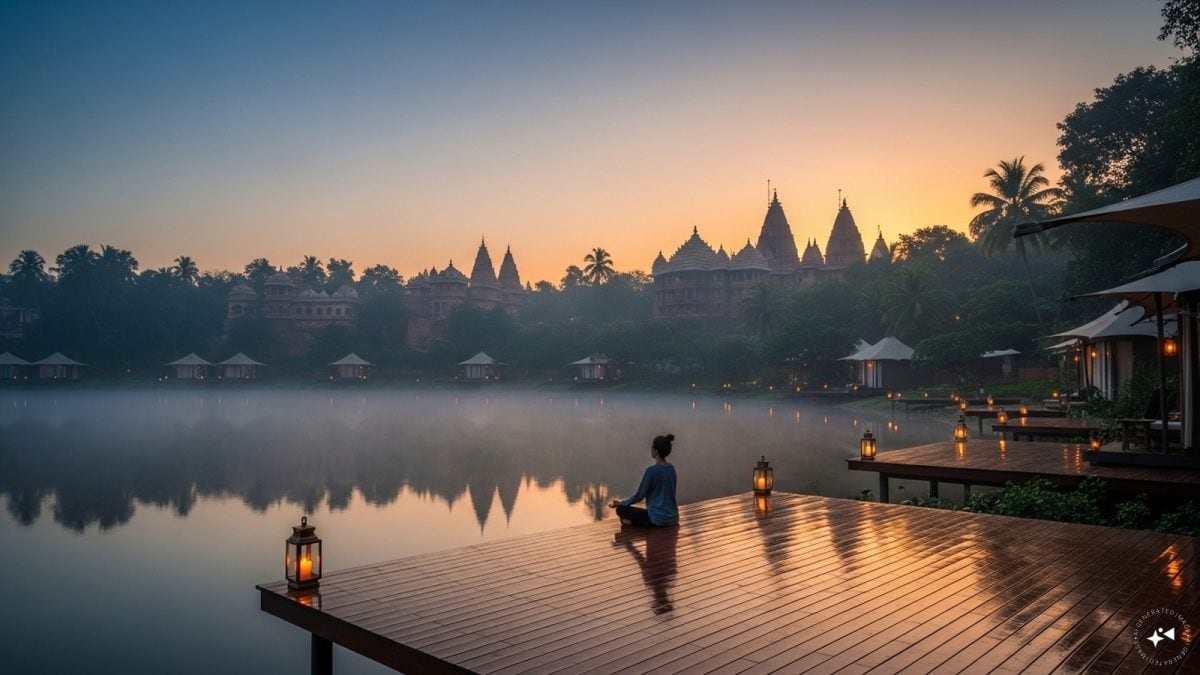Last Updated:
Spiritual luxury in India lets travellers slow down, unplug, and explore faith with comfort, blending mindfulness with indulgence for a unique journey

The travel trends of 2025, have shown nearly 80% of Indians now seek immersive, experience-led stays rather than just sightseeing blending faith with indulgence (Representational)
A quiet shift is taking place in the way India travels. The same travellers who once sought beach villas or city breaks are now packing for mountain monasteries, temple towns, and forest retreats not just to unwind, but to reconnect.
Yet, these are not pilgrimages in the traditional sense. They are curated journeys where spirituality meets sophistication, where the Ganga Aarti is followed by an Ayurvedic spa session, and where meditation rooms come with panoramic views and herbal teas brewed to match your dosha.
According to Booking.com’s How India Travels 2025 report, 8 in 10 Indians now spend most of their vacation within their accommodation, choosing places that promise more than just a stay, they want self-reflection, design, and a sense of purpose. The rise of “spiritual luxury” signals a new mindset, travellers no longer want to escape life; they want to feel aligned with it.
India’s inbound travel is also on the rise, with even the international visitors keen to experience the country’s spiritual and cultural depth during major festivals such as Dussehra and Diwali. Travel aggregators have reported a 23% increase in bookings for spiritual destinations during the festive quarter compared to last year, driven by both domestic and foreign travellers seeking meaning and rest in equal measure.
The 2024 McKinsey Travel Recovery Report noted that the global travel industry regained full strength by late 2024 after losing up to 75% of its market value during the pandemic. Domestic travel now accounts for roughly 70% of total tourism spending in emerging markets, with India projected to see a 9% annual growth in travel expenditure through 2030.
How Did the Concept of “Luxury” Evolve to Include Spirituality?
Luxury once meant marble lobbies, private butlers, and Michelin-starred dining. Today, it is increasingly defined by inner peace, digital detoxes, and authenticity. The pandemic triggered a global rethinking of what it means to live well, and this shift has trickled into how people travel. Research by the World Travel and Tourism Council (WTTC) in 2024 showed that 46% of travellers prioritise mental wellbeing and emotional restoration when planning holidays.
In India, where spirituality has always been deeply intertwined with daily life, this new understanding of luxury could feel natural. Travellers now want hotels that offer guided meditation sessions, private temple visits, Ayurvedic diets, and silence retreats. The goal is no longer escape but reconnection with oneself, with nature, and with heritage.
This trend has also reshaped hospitality investments. According to the Federation of Hotel and Restaurant Associations of India (FHRAI)-2025, more than 300 new premium properties are being planned across spiritual hubs such as Rishikesh, Tirupati, and Bodh Gaya, positioning India as one of the world’s fastest-growing spiritual tourism markets valued at an estimated USD $59 billion.
Which Indian Destinations Are Redefining Spiritual Travel in 2025?
India’s spiritual geography is vast, and its reinterpretation through a luxury lens makes it all the more compelling. Below are some of the key destinations leading this transformation.
Varanasi, Uttar Pradesh
Varanasi, the eternal city on the Ganges, has long drawn pilgrims seeking moksha — liberation from the cycle of rebirth. What has changed is how travellers now experience it. The city’s Tent City Niraan resort, a luxury tented enclave by the river, offers a rare mix of spiritual proximity and modern comfort. Guests can meditate by the ghats at dawn, then retreat to spa treatments or private dining overlooking the water.
The Kashi Vishwanath Temple, the newly renovated corridor, and the famed evening Ganga Aarti remain central experiences. However, visitors are now exploring Varanasi’s spiritual essence through curated rituals, sound healing sessions, and art walks that reinterpret ancient traditions for a contemporary audience.
Rishikesh, Uttarakhand
Often called the “Yoga Capital of the World”, Rishikesh is witnessing a surge in luxury wellness retreats. The area around Ram Jhula and the historic Beatles Ashram still draws seekers from across the world, but the experience now feels more elevated. Luxury camps at Aspen Riverside, Riverside Swiss Camps and boutique yoga resorts near the Ganges offer programmes that merge Ayurveda, meditation, and energy therapies.
Travellers can book private yoga consultations, indulge in vegan fine dining, and explore ancient temples like Trayambakeshwar with guides trained in Vedic philosophy.
As the gateway to the Char Dham pilgrimage circuit- Yamunotri, Gangotri, Kedarnath, and Badrinath, Rishikesh allows guests to combine spiritual depth with physical luxury, creating a new benchmark for mindful travel.
Amritsar, Punjab
At the heart of Amritsar lies the Golden Temple, one of the most serene spiritual sites in the world. Its gilded architecture, reflected in the surrounding water, continues to captivate millions. Yet, the experience around it is evolving. High-end stays like the Taj Swarna and WelcomHeritage Ranjitvilas now cater to travellers seeking tranquillity along with comfort.
Beyond the temple, cultural attractions like the Partition Museum and Gobindgarh Fort add historical depth. Travellers can spend mornings in silent reflection at the Harmandir Sahib and evenings tasting Amritsari cuisine, experiencing the city as both spiritual and sensory.
Prayagraj, Uttar Pradesh
At the sacred confluence of the Ganga, Yamuna, and the mythical Saraswati lies Prayagraj’s Triveni Sangam, a spiritual nucleus for pilgrims seeking purification through a holy dip. The Bade Hanuman Ji Mandir, where the deity rests in a rare reclining posture, draws devotees seeking strength and protection. During the Magh and Kumbh Melas, the city transforms into a global pilgrimage hub.
Devotees now stay in ultra-luxury camps known as the Dome City by Evolife and Aagman India Camps, which combine faith and comfort with high-end amenities along the riverbanks.
Tiruvannamalai and Tirupati, Arunachal Pradesh and Tamil Nadu
Tirupati remains one of the world’s richest pilgrimage sites, visited by millions annually. In recent years, high-end hospitality has grown around it, offering devotees premium stays and personalised darshan arrangements. Nearby, Tiruvannamalai, known as “Dakshina Kashi”, offers a more introspective retreat around the sacred Arunachala Hill.
Eco-certified resorts like sparsa thiruvannamalai have become models for sustainable spiritual travel, combining eco-conscious design with traditional Tamil architecture. Visitors participate in meditation, temple rituals, and nature walks experiences that prioritise calm and clarity over opulence.
Gokarna, Karnataka
Once a quiet temple town, Gokarna has evolved into a dual destination, sacred and scenic. Its Mahabaleshwar Temple houses a thousand-year-old Shiva Linga, while the coastal landscape offers pristine beaches ideal for meditation and solitude. Boutique resorts like Red Earth and Kahani Paradise offer both spiritual seekers and wellness-focused travellers.
Guests spend mornings attending aarti ceremonies and evenings in yoga sessions overlooking the Arabian Sea. The balance of divinity and design encapsulates what spiritual luxury now means in modern India.
Why Are Young Travellers Drawn to “Soulful” Luxury?
A growing number of millennial and Gen Z travellers are shaping this trend. Unlike previous generations, they view travel as a means of self-development rather than indulgence. According to Expedia’s 2024 Future of Travel survey, 67% of millennials prioritise emotional wellbeing when selecting destinations, while 58% actively seek trips that promote personal growth.
For this generation, wellness has evolved beyond massages and fitness. It encompasses energy healing, sound therapy, and ancient wisdom repackaged in contemporary formats. As social media continues to highlight mindful living, many travellers are drawn to the aesthetic of serenity sunrise meditations, herbal teas, and minimalist retreats as much as the practice itself.
This shift has made “spiritual luxury” not only a travel category but also a lifestyle statement. It speaks to the need for balance in a world defined by burnout, digital overload, and climate anxiety.
Is Spiritual Luxury the Future of Tourism?
The convergence of spirituality and luxury is more than a passing trend. It reflects a deeper evolution in how India defines both travel and wellbeing. The government’s Incredible India 3.0 campaign, launched in 2024, is focusing on experience-led tourism, highlighting spiritual circuits alongside wellness and eco-tourism.
With international wellness tourism projected to reach USD 1.3 trillion by 2027, according to the Global Wellness Institute, India’s positioning as a global spiritual destination is both natural and strategic. Luxury hospitality brands are responding swiftly introducing “mindful suites”, vegan tasting menus, and curated spiritual itineraries.
What this suggests is that India’s tourism future will depend as much on emotional resonance as on infrastructure. Travellers are no longer looking for the most opulent resort; they are seeking the most transformative journey.
October 22, 2025, 07:30 IST
Stay Ahead, Read Faster
Scan the QR code to download the News18 app and enjoy a seamless news experience anytime, anywhere.







